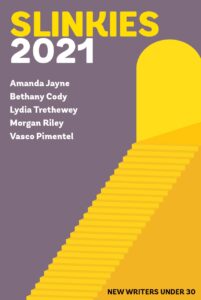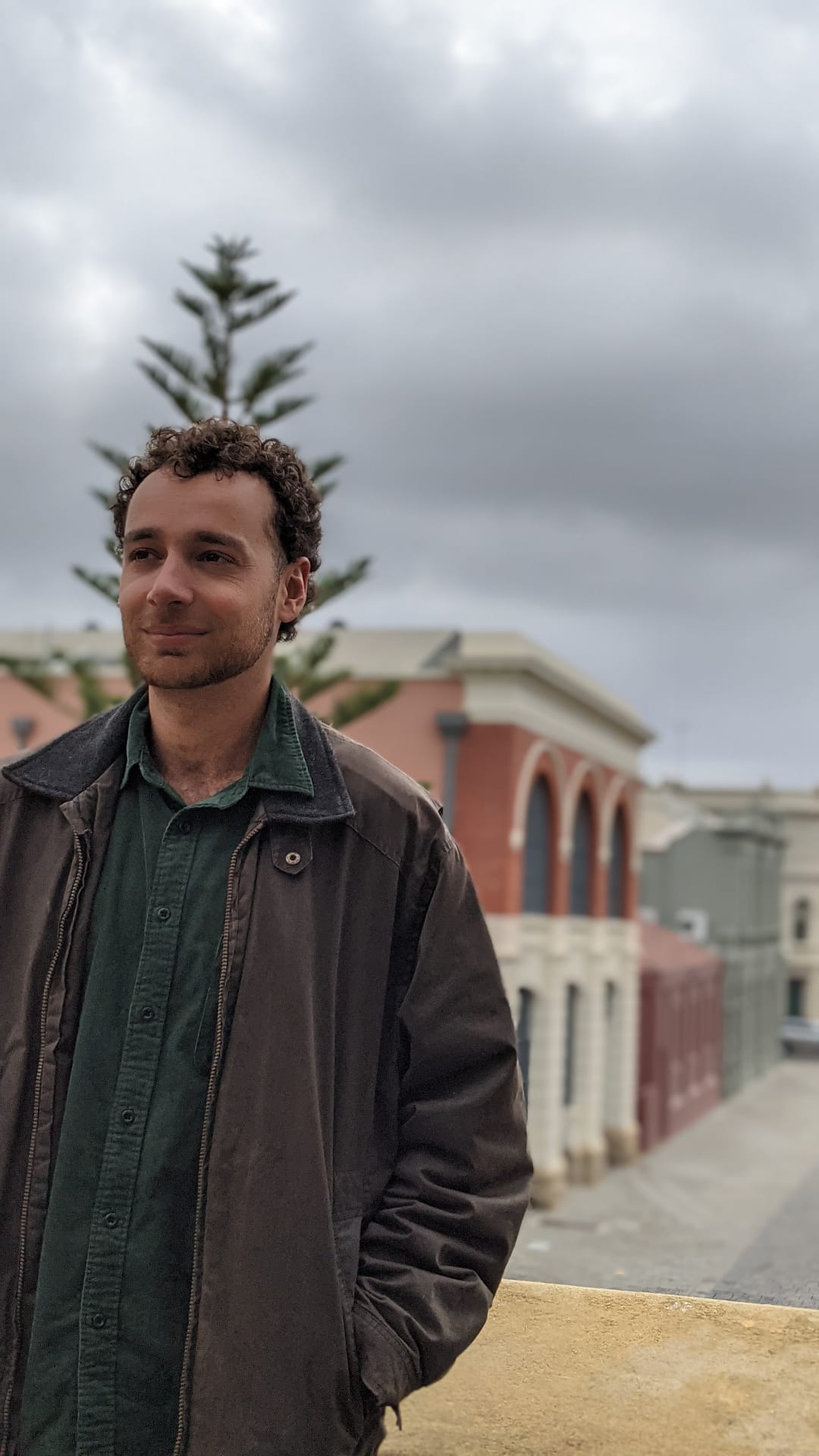We are thrilled to introduce you to bilingual writer, Vasco Pimentel whose short story, ‘The Last Fence’ is published in the 2021 Slinkies anthology. In this interview with publishing intern, Jessica Duff, Vasco talks about the origin of his story, about writing in a pandemic and about his writing process. To find out more about this year’s Slinkies, join us on Friday October 1 at 8pm for the online launch of this excellent publication as well as literary trivia, giveaways and the lowdown about Slinkies 2022. Register here.
Were the characters in ‘The Last Fence’ inspired by anyone from your personal life?
It’s hard to say. I like to think of writers as sponges, soaking in every glimpse of life around them. Sometimes when I start building a character, I’ll have someone in mind whose essence I try to replicate in one way or another. This will only take you so far in your character-building, but it’s a good starting point. With ‘The Last Fence’, I didn’t have anyone in mind per se – it all started taking shape when I pictured a woman sitting on a porch, admiring the horizon. The inspiration for this protagonist can perhaps be said to have stemmed from all the strong women in my life. I believe that if you want to write meaningful fiction, you should surround yourself with interesting people. By doing this, you’ll have an endless source of inspiration.
 Did the Covid-19 pandemic play a role in the setting you created?
Did the Covid-19 pandemic play a role in the setting you created?
Definitely. I think that the upside of this virus was that everyone had a chance to stop and re-evaluate their priorities in life. When it first started, I was studying full-time and working part-time. By the time a lockdown was put in place, life’s frantic pace came to a halt, and I found myself at home. This newfound time to reflect led me to think about how everyone was asked to play their part towards the greater good and stay indoors. For the people in rural Australia who live in an almost self-sufficient state of isolation themselves, everyday life would not change much. It was this idea of the protagonist trying to defend her lifestyle and core values amid the farm’s pristine fences that really pushed me to write this story. By the time you have figured out your source of conflict, everything just unfolds from there.
What has the experience of being published for the first time been like so far?
If you had told me a year ago that I would have my story published in this anthology, I wouldn’t have believed it. I guess ‘The Last Fence’ marked a stage in my (short) writing career where I grew my confidence and started submitting my work everywhere I could. Sharing your work can be one of the most daunting tasks an artist can do, but I can thank my university tutor for believing in my work. I read as widely as possible and followed some great advice to thrive in failure: half of my bedroom wall is covered in rejection email printouts, which fuel me to do better. The only bad story is the one that doesn’t get written.
Was writing a part of your childhood? What initially got you into writing?
Definitely. I remember one of the first honest dollars I earned in my life was when my auntie bought a small comic book I had written. I still have most of my unfinished projects from when I was a kid and decided to write whole books. I never got even close to finishing any of them, but the writing bug was there. I’d have to say I got into writing because I always loved reading; I thank my parents for it, along with my late grandmother, one of the greatest storytellers I got to know. I guess coming from a small but exceedingly proud country like Portugal helped me strive to be like Saramago, one of my favourite writers and an outstanding artist. Even my school was named after another one of the greats, Fernando Pessoa, so I can say the country’s great education system gave me all the inspiration I needed.
Why have your story take place on a farm? Do you have any farming experience?
Having been brought up in Lisbon, I have always been fascinated by the pace of life in rural areas. I wanted to try and capture a glimpse of the great Outback, arguably one of the most authentic things one can get to experience in Australia. People who live rurally are more down to earth, perhaps due to the lack of reliance on technology in their everyday life. Two of my best friends house sit all around the South-West of Western Australia, a truly stunning part of the world, and I absorbed as much as I could when I lived with them. I believe most of the inspiration for ‘The Last Fence’ came from these ventures.
As of farming experience, my dad used to pull me out of bed during weekend mornings and put a hoe or shovel in my hand, which at a young age I used to absolutely loathe. In hindsight, these were some of the best working values I could have been given.
You are a bilingual writer, fluent in English and Portuguese. How has this impacted your writing?
Different languages wire different pathways in your brain when you are putting sentences together. I read, wrote, and processed my thoughts in Portuguese for eighteen years until I moved to Australia. It is interesting how from that point onwards I started functioning solely in English, and it’s hard to imagine it any other way now. For any aspiring writer out there who might see this as a disadvantage, I would encourage them to thrive in it, for perhaps the moment you push yourself and try and learn a second language, your brain will shorten the gap between not only ways of thinking, but also whole cultures, inviting new ways of interpreting the world around you. The next challenge I want to take on will be to start translating some of my stories back to Portuguese to try and see what I can come up with. Even if the translation does not bear any impressive results, perhaps when I read it in a different language it will bring a new breakthrough to the story.
Can you describe your writing process? What steps do you follow? Do you have any unusual writing habits?
The vast majority of my writing is done in the morning. I get out of bed, make myself a cup of coffee and start writing. I try to write freely and to kill any sudden editing urges I might have. If this succeeds and I start getting hungry (getting the brain working usually does it), I will keep on writing for as long as I possibly can. By this time, I have usually produced something worth a reward, and so I’ll have a break and cook some breakfast. I find this to be one of the most important features of my writing habits, much like a donkey with a carrot on the end of a stick, if I know I have a nice piece of bacon as a reward for gathering all my brain cells, things just flow better. After breakfast I might feel like writing more, but this is unusual. If I have written for a few hours, I find that it is better to let it rest and come back the following morning for more. I would call these the good days.
For the bad days, if I haven’t gotten myself together to produce something useful, I will try and read, even if just a couple of pages. Throughout the rest of the day, I will go on about my business as usual, but I always make sure to have something I can scribble some ideas down on. The best breakthroughs come at the weirdest of times, so make sure you’re ready to capture them!
What other projects are you currently working on? Where can people catch you on the internet?
At the moment I am on the verge of starting my sixth and final university semester for my Creative Writing degree, which takes up the majority of my time.
I also usually try to set some other looming deadline over my head for all sorts of different writing competitions and prompts. This assures that I always have something to work towards, along with other university deadlines. I usually set these competition announcements as the screensavers on my phone so I remind myself of the endless possibilities out there when one stops procrastinating.
As for finding me online, I have my website up where you can find most of my work at https://paper-trails.art, and you can find me on Instagram as vpimentelau .

